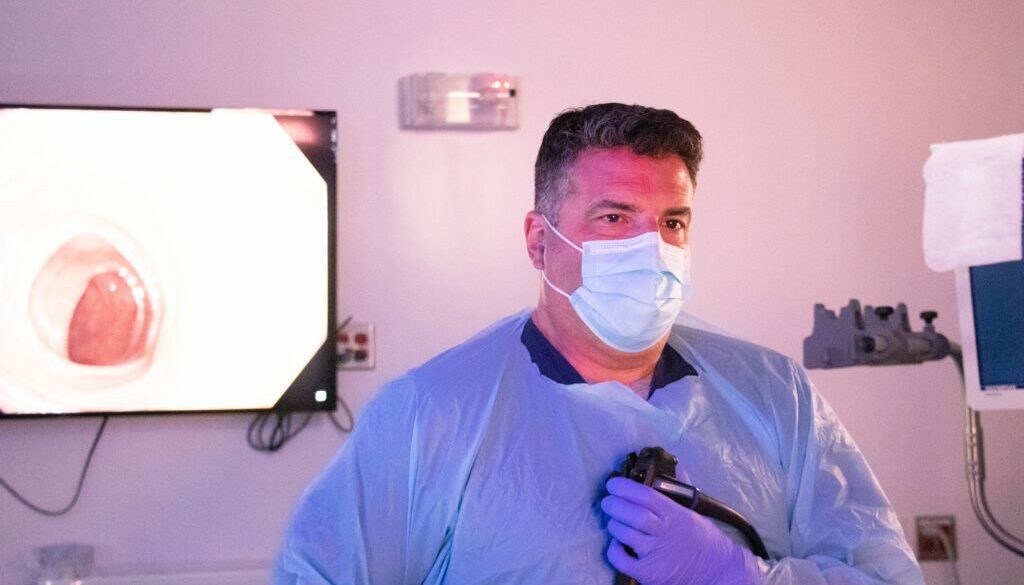Why the colonoscopy remains the best tool for preventing colon cancer
First published by myhorrynews.com and Waccamaw Publishers in the March 2023 Horry County Health & Wellness Section
When Dr. Robert Yacavone began practicing in Horry County, the gastroenterologist noticed that a significant number of patients preferred mail-in colon cancer tests over the traditional colonoscopy.
That concerned Yacavone, who advised them that “less invasive” doesn’t mean better.
“This is like choosing a Ford when a Mercedes is available,” said Yacavone, one of the doctors at CMC Digestive Health. “Colonoscopy is by far the best colon cancer screening test because it is the only test that functions not only in screening but in prevention.”
With mail-in tests, a patient sends a stool sample to a lab that analyzes the stool for two things: the presence of blood and abnormal DNA. The goal of these tests is to find evidence of colon cancer, and the results are reported as negative or positive. However, the reason for the positive test isn’t clear.
“When it’s reported as positive, you don’t know whether it was positive because blood was detected or it was positive because abnormal DNA was detected,” Yacavone said. “That’s one interesting factor because obviously there are a lot of reasons that blood could be detected that are perhaps not so significant, like hemorrhoids and other abnormalities that may result in blood in the stool that have absolutely nothing to do with colon polyps or colon cancer.”
Yacavone also noted that these stool-based tests are only appropriate for asymptomatic patients of average risk. That means patients with a family history of colon cancer or those with an underlying condition that increases risk of colon cancer (such as chronic inflammatory bowel disease) should not be relying on a mail-in test. He stressed that the tests are inappropriate for any patients with symptoms such as unexplained weight loss, a change in bowel habits (sudden constipation or diarrhea), or visible blood in stool.
Yet even for people who meet the criteria for the mail-in test, the benefits of the colonoscopy are far greater.
“The major difference is that the stool-based tests are a colon cancer detection test,” he said. “They are not a good colon cancer prevention strategy. So that’s a major, major difference.”
Why does that distinction matter? Because preventing cancer is better than simply finding it. Through a colonoscopy, doctors can detect precancerous polyps, allowing them to remove those before they develop into colon cancer.
A mail-in test, however, is designed to discover a cancer that’s already present. One popular test misses nearly 60% of precancerous polyps.
March is Colorectal Cancer Awareness Month. While treatments for colorectal cancer have improved over the years, doctors insist that prevention is the goal, and the colonoscopy remains a critical part of that strategy.
The procedure is a simple one. A patient contacts his or her physician, schedules the colonoscopy and then receives information about preparations. The day before the screening, the patient stays on a liquid diet and doesn’t consume anything after midnight on the day of the screening. Patients are sedated for the test, which takes about 30 minutes. Afterwards, there’s a 30-minute recovery period and then the patient returns home and can enjoy a normal diet.
In recent years, doctors have noticed an increase in colon cancer among younger adults. That led them to reduce the recommended age for a colonoscopy from 50 to 45 for patients of average risk. How often the test is needed depends on the patient. Someone with no polyps and no family history of colorectal cancer would not need another colonoscopy for a decade. Someone with a family history of the disease would need another one in five years.
Yet just getting a colonoscopy is critical, and too many people put off what could be a lifesaving procedure.
“If you look across our population of patients who are eligible for screening, one-third of patients are not up to date with screening,” Yacavone said. “We believe that we can reduce colorectal cancer deaths by 60% if we fully adhere to the screening guidelines. That’s a very significant impact.”

Dr. Robert Yacavone
Fellowship trained in Gastroenterology / Advanced Endoscopy at Mayo Clinic
Dr. Yacavone is Board-certified in Gastroenterology through the American Board of Internal Medicine (ABIM). His particular interest and focus is in the endoscopic diagnosis and treatment of biliary tract diseases (bile duct stones, bile duct infection, bile duct cancer), and pancreas disease (pancreatic cancer, chronic pancreatitis). Dr. Yacavone performs colonoscopy for colon cancer screening and performs advanced colon polyp removal (endoscopic mucosal resection and endoscopic full-thickness resection) which allows some patients with large precancerous polyps to avoid the need for surgery.
To set an appointment with Dr. Yacavone at CMC Digestive Health, call 843-347-6038 to request an appointment today!




